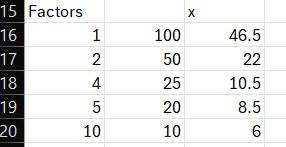Find all of the positive integers that make the following expression a perfect square.
(1) ![]()
Let
![]()
where ![]() is an integer.
is an integer.
Expand and simplify
![]()
![]()
![]()
![]()
Factorise (using difference of perfect squares)
![]()
Find all of the factors of ![]()
![]()
First pair,
![]()
![]()
![]()
![]() must be an integer.
must be an integer.
I then used a spreadsheet

 values.
values.Hence the integers that make ![]() are perfect square are,
are perfect square are, ![]() and
and ![]() .
.
Let’s try another one,
![]()
(2) ![]()
![]()
![]()
![]()
Factors of 100,
![]()

So the possible integers are ![]() and
and ![]() .
.
